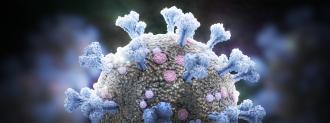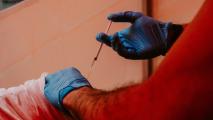Scientists have discovered a coronavirus antibody that prevents the virus from being able to infect cultured cells.
This discovery — from a peer-reviewed study published Monday in Nature Communications — could lead to a breakthrough treatment or prevention of COVID-19, a disease that has infected 3.3 million people worldwide and killed 235,000 so far.
The Hunt for a Coronavirus Antibody
When a virus or bacteria infects the body for the first time, the immune system creates blood proteins called antibodies to help it identify and kill the pathogen if it ever turns up again in the future.
That means people with antibodies for the novel coronavirus have a level of immunity to it. Researchers have been exploring ways to use those antibodies as a potential weapon in the battle against COVID-19.
The researchers used genetically altered mice, designed to produce antibodies similar to those found in humans.
But all antibodies are not created equal — different antibodies can bind to different parts of a pathogen.
In some cases, the pathogen may still be able to infect a person even with an antibody stuck to it. In others, the antibody may neutralize the pathogen, killing its ability to infect human cells.
For this new study, researchers sought to find a coronavirus antibody that would neutralize SARS-CoV-2 by binding to the spike protein it uses to infect human cells.
And rather than looking for this antibody in the blood plasma of COVID-19 survivors, they discovered it using genetically altered mice that were designed to produce antibodies similar to the ones found in humans.
An Alternative to Convalescent Plasma
Scientists at Utrecht University, Erasmus Medical Center, and Harbour BioMed injected their transgenic mice with the spike proteins of several viruses, including SARS-CoV-2, SARS-CoV, and MERS.
This prompted the mice to produce 51 cells the researchers could use to create antibodies. The researchers then tested the antibodies to see if they could neutralize SARS-CoV-2 in cell cultures in the lab — and discovered one coronavirus antibody that could. Next, the researchers took the antibody — known as 47D11 — and altered it in the lab to create a fully human version.
“Such a neutralizing antibody has potential to alter the course of infection in the infected host, support virus clearance, or protect an uninfected individual that is exposed to the virus,” Berend-Jan Bosch, the study’s co-lead author, said in a press release.
The coronavirus antibody was also able to neutralize cell cultures of SARS-CoV, the coronavirus that spread across more than two dozen countries in 2003 and 2004, leading Bosch to note that it might be able to help us address future coronaviruses as well as the one that causes COVID-19.
Of course, just because an antibody can neutralize a virus in a petri dish doesn’t mean it’ll be able to do the same thing in humans. The researchers now plan to focus their attention on animal models as a next step in development.
If the coronavirus antibody is effective at neutralizing SARS-CoV-2 in humans, though, it could prove far more useful as a treatment than convalescent plasma, Babak Javid, a consultant in infectious diseases at Cambridge University Hospitals who wasn’t involved in the study, told Newsweek.
Rather than relying on plasma donations from coronavirus survivors, manufacturers could easily produce large quantities of the single antibody, Javid said, adding that the use of these manufactured antibodies would eliminate the safety concerns inherent in blood transfusions.
We’d love to hear from you! If you have a comment about this article or if you have a tip for a future Freethink story, please email us at [email protected].






